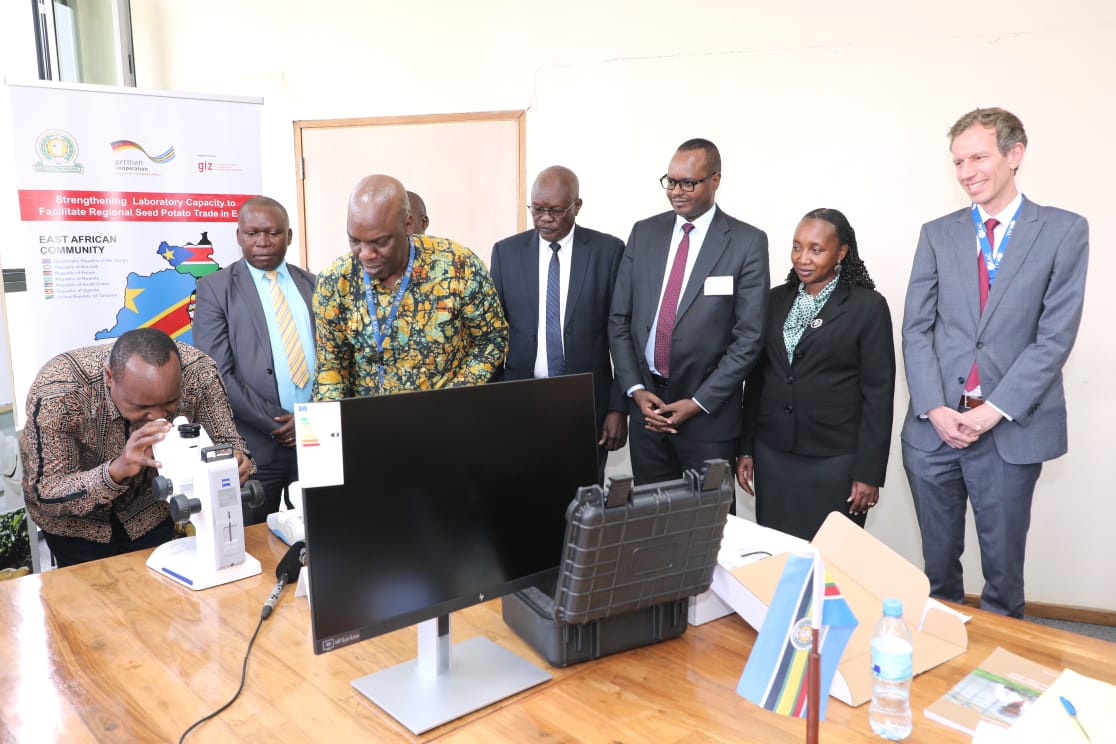On Friday 2 December, GIZ handed over lab equipment and consumables for designated National Plant Protection Organizations (NPPOs) to the EAC Secretariat. The equipment will strengthen the capacity of NPPOs to effectively operationalize sanitary and phytosanitary measures to facilitate regional seed potato trade.
Opening the handover, the EAC Secretary General, Hon. Dr. Peter Mutuku Mathuki, stressed that that the potato subsector was one of the priority value chains in the EAC region and thanked the German government for its support to increase trade in seed potatoes.
In fact, potatoes are key to food security and to reviving local economies in the EAC. Their production and relevance is growing as outlined by the new EAC Regional Seed Potato Strategy and Action Plan. On the other hand, the production of certified seed potatoes is still in its infancy in all EAC Partner States. Different phytosanitary requirements for seed potatoes have been recognised as non-tariff trade barriers. Harmonisation structures and processes are in place that can be used and strengthened. Well-regulated trade with seed potatoes between the countries of East Africa should provide crucial incentives for the private sector to step up its investments in seed potato production.
Against this background, the German government supported the EAC Secretariat with its project “Improvement of regional trade with seed potatoes in Eastern Africa”, which is part of the global project Agricultural Policy and Innovation Fund (FABI), implemented by EAC-GIZ under the special initiative "ONE WORLD – No Hunger" of the German Federal Ministry for Economic Cooperation and Development (BMZ).
The project aimed at increasing trade with seed potatoes in the EAC by strengthening national and regional seed potato standardisation processes as well as national capacities for phytosanitary inspection and certification of seed potatoes. This follows the logic that through strengthened national processes and actors, regional exchange can lead to harmonised seed potato standardisation processes.
In his remarks, Max Middeke, Deputy Progamme Manager “Support to the East African Integration Process” (SEAMPEC II) noted, “With the handover of the equipment today, we count on you (Partner States) to take the equipment home and bring it into use. It was a long and cumbersome process to import the laboratory equipment to Arusha. Let’s ensure together that it was worth it!”
The procurement of lab equipment and consumables for designated NPPOs is one of the key outputs of the project to support the quality infrastructure. This infrastructure capacity support includes field deployable diagnostic kits for detection of diseases and viruses, onsite and at point of entry, from stem, leaf, tuber, and soil, giving reliable quick results, without the need to send test samples to labs far away from production and trading points.
As the handover also marked the end of the FABI project, Mr. Middeke highlighted the successes of the project such as the development of a regional strategy and action plans and strengthening of regional seed potato standardization processes by operationalizing the newly-established Jumuiya Potato Platform.
Mr. Middeke congratulated the EAC Secretariat and the different stakeholders of the national and regional platform for their achievements so far. “With the EAC Regional Seed Potato Strategy and Action Plan for the next year, the priorities and necessary actions for further developing the sector are clearly outlines. Let us continue our collaboration to successfully implement the strategy.”
Even after FABI’s closure, GIZ via SEAMPEC II stands ready to support priority policy measures for seed potatoes to strengthen linkages and collaboration among stakeholders across the seed potato value chain and promote trade in seed potatoes.
More information on SEAMPEC II can be found here
